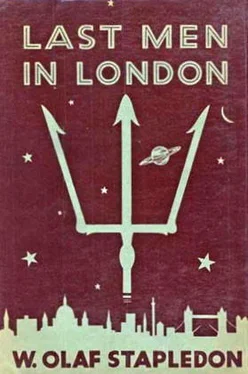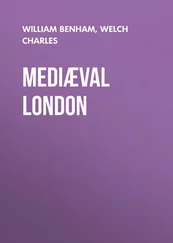Without my help it might have taken Paul some years to outgrow his phase of mental obedience and spiritual confusion. But time was pressing. I needed him to be well-advanced in his next phase at the close of his university career, so that he might be prepared to meet the crisis of 1914 in a significant manner. Therefore, when I had allowed him some months of play in his little Christian nursery, I began once more to exercise my influence upon him. I infiltrated him with images of cosmical majesty and horror, with apprehensions of human weakness and meanness and agony, with doubts and questions intolerable to his religion.
During the previous two years Paul had come across a number of distressing facts about the world, but he had contrived to see them in the rosy light of his religion. These experiences now, through my influence, began to haunt him. At all times of the day and night he was now liable to sinister visual and auditory images, either taken intact from his own past, or reconstructed in still more repugnant forms. It was as though hitherto he had been wandering in a luxuriant but volcanic land in which only now and again he had encountered the blow-holes and sulphurous jets of nether chaos; but now, it seemed, the whole terrain was heaving, cracking, belching under his feet. Over his books in his own comfortable suburban home he would be distressed by visions of the slum-tenement homes that he had visited when he was working for an ‘after-care’ committee. And somehow they seemed more sordid and overcrowded in imagination than in reality. While he was walking on the down, he would remember with abnormal distinctiveness a brawl that he had once witnessed in the East End. Bottles were thrown. A man’s face was cut. A woman was knocked over. Her head came against the kerbs tone with an audible crack, like the collision of bowls on a green. While he was reading or eating or walking, and especially while he was lying in bed and not yet asleep, faces would confront him; faces which, when he had encountered them in actuality, had seemed but opaque masks, grey, pinched, flabby, or purplish and bloated, but now in imagination revealed their underlying personalities to him with harrowing expressiveness. For I permitted him to see them as they would have appeared to a Neptunian fresh from the world of the Last Men. He had once been shown over a lunatic asylum. The faces that now haunted him were, he recognized, faces of sane men and women, yet they reminded him distressingly of those imbecile faces. Faces of all kinds they were, young and old, business men, fashionable women, unshaven labourers, clerks, young bloods, lawyers; all pushing themselves forward at him, leering, smirking, whimpering, impressing, imploring, all so intent, so self-important, so blind. Somehow they reminded him of cheap ornate lamps, rusty, shop-soiled, and never lit. The queer phrase ‘blind lamps’ reiterated itself to him on these occasions. Another image haunted him in connexion with these faces, and seemed to him to summarize them all and symbolize the condition of his species. It was an image which I constructed in his mind in detail and with verisimilitude, and endowed with a sense of familiarity, though in fact it was not derived from his past but from his future experience during the war. He seemed to see, lying in mud, a dead mare, already decaying. From its hindquarters, which were turned towards him, there projected the hideously comical face of its unborn foal. The first time he encountered this apparition Paul was at a political meeting. Before him on the platform sat a company of politicians, city worthies and their wives. A cabinet minister was perorating. Suddenly Paul saw the foal, and in a flash recognized its expression in the speaker, in the ladies and gentlemen on the platform, in the audience. His gorge rose, he thought he was going to vomit. Stumbling over his neighbour’s feet, he fled out of the hall. Henceforth he was very prone to see the foal, at lectures, at dances, in church. Even in the Archangel’s smile he sometimes recognized with horror that foetal grin.
Another type of imagery and of thought I also forced on Paul at this time. I first impelled him to read works of contemporary literature and science which were discountenanced by the Archangel. Furtively he began to return to the interests that had been roused in him before he came to the university, interests in the intricacy of the physical world, in the types of living things, in the theory of evolution, in the astronomical immensities. But whereas formerly these things delighted him, now they terrified him, even while they fascinated. I took care that they should haunt him with imagery. He had curious sensations as of sweeping with increasing speed through space, while the stars streamed past him like harbour lights. Sometimes it seemed to him that he was dropping into the tumultuous and incandescent vapours of the sun. Sometimes he glimpsed spinning worlds, parched and airless, uninhabited, meaningless.
When Paul had been subjected to this violent influence for some weeks, he began, like many of his contemporaries, to find a kind of consolation in the theory of evolution, romantically interpreted. It made worm and ant and man fellow-workers in a great cause. Exactly what they were all working for, he did not know; nor could he justify his strong conviction that, though all had achieved something, man was doing far more than the others, and might yet do infinitely better. Those thrusting imbecile faces that haunted him, and were the faces of his fellow-men and himself, those foal faces, were really not men at all, not what men should be and might be, any more than the grinning and putrefying foal was a horse. Gallantly Paul now began to convince himself that the whole universe was striving toward some supreme expression of life, though blindly in conflict with itself, torturing itself. He wrote a poem in which man appeared as ‘the germ of the cosmic egg’. Later he tore it up and wrote another in which the cosmic egg was said to consist entirely of germs, each of which was trying to devour the others and include their substance in its own expanding form. In another he declared that God was’ the Soul of the World, striving to wake’. He put great pains into the making of these verses, and had a sense of vision and achievement such as he had never known before. One short poem I quote, as it shows clearly the rebirth of my influence in him and the quickening of his own imagination.
EVANESCENCE
As a cloud changes,
so changes the earth.
Coasts and valley
and the deep-rooted hills
fade.
They last but for a little while;
as cloud-tresses among the rocks,
they vanish.
And as a smile gleams and fades,
so for a very little while.
Life rejoices the earth.
From the beginning fire,
then frost, endless.
And between, the swift smile, Life.
From the beginning fire,
then frost, endless,
and between –
Mind.
Paul ventured to show these poems to the Archangel. The young author was diffident about them, and did not expect them to be taken very seriously; but the manner in which the Archangel received them was something of a shock to him. Gently but also emphatically the priest told him that he was in danger of serious heresy. God could not be the soul of the world, since he had created the world and would survive the world. As for the cosmic egg, still more the evanescence of life in the universe, Paul ought to realize that such bizarre ideas were dangerous, since they obscured the central fact of religion, namely the direct and eternal intercourse between God and man. Surely that amazing fact was far more interesting than these grotesque fancies. Paul was so upset that he turned actually dizzy and faint. No wonder, for here was the being whom he respected above all others and even took to be in some manner divine, condemning ideas which to Paul himself seemed to have very far-reaching and very beautiful significance.
Читать дальше












